Nootropics have become a popular topic for discussion among college students. Even if you haven’t heard the term, you’re probably familiar with the idea of smart drugs that help you study. So, what are nootropics? What role should these play in an academic environment?
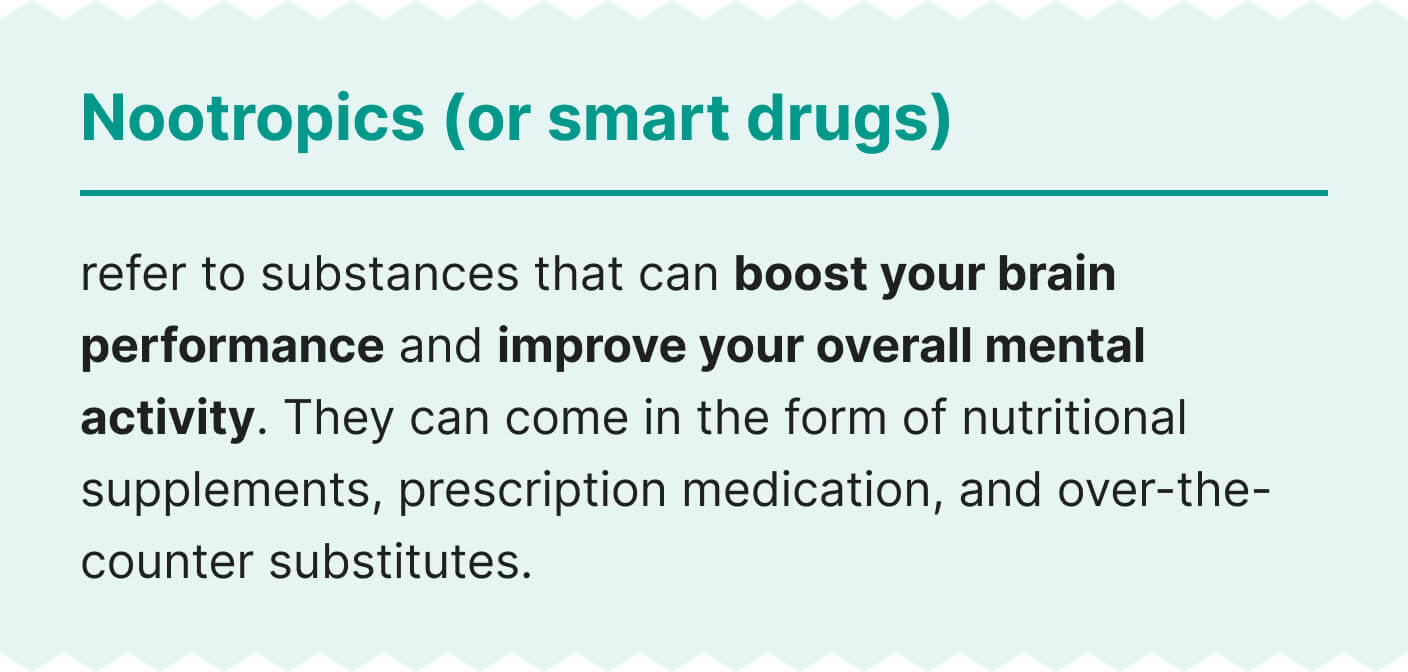
We get it: there is too much work and too little time. Any magic pill that can enhance your memory would come in handy when preparing for finals, finishing your term paper, or meeting deadlines. However, nonprescription nootropics are a controversial subject for a reason.
In this article, our IvyPanda team has dug deeper into the subject, discussing the different types and functions of various smart drugs. We’ve also prepared a list of supplements that will increase your concentration and mental alertness.
🧪 Nootropics: Original Definition
The term nootropic was coined by Dr. Corneliu E. Giurgea in 1972. He was the first chemist to synthesize a smart drug (piracetam) and explore how it could be used. In his study, The Nootropic Concept and Its Prospective Implications, Giurgea examined all the research available and provided a comprehensive overview. He was also the first to establish a definition of the term smart drug, although that interpretation has since changed.
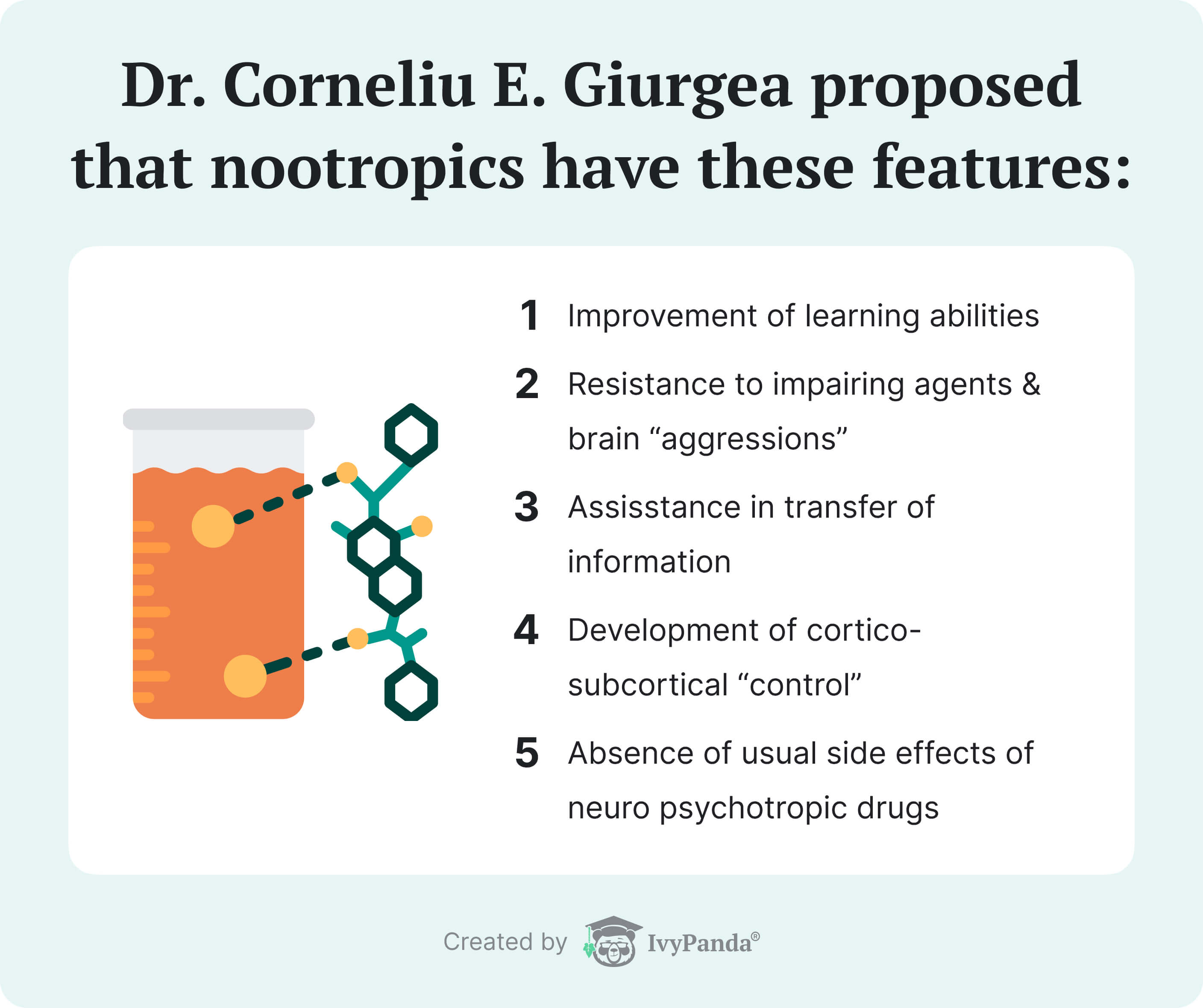
Smart drugs have become a controversial topic in high schools and colleges. As we’ll explain below, not every nootropic is safe. What’s more, harmless options can become dangerous for people when taken in high doses or too often. We’ll focus on these issues in later sections. For now, let’s identify what nootropics are.
✅ Smart drugs are substances that:
- enhance cognitive performance to some extent;
- pass the blood-brain barrier;
- have minimal side effects when taken properly;
- lack vasoconstrictive or vasodilative actions.
We’ve taken these features from B. P. H. Poshel’s study, New Pharmacological Perspectives on Nootropic Drugs.
🧫 Major Types of Nootropics
As we’ve already covered, there are many kinds of nootropics. On the Internet, you can find anything, from placebo pills to drug-related substances, so to classify them, we will focus on the method of their creation.
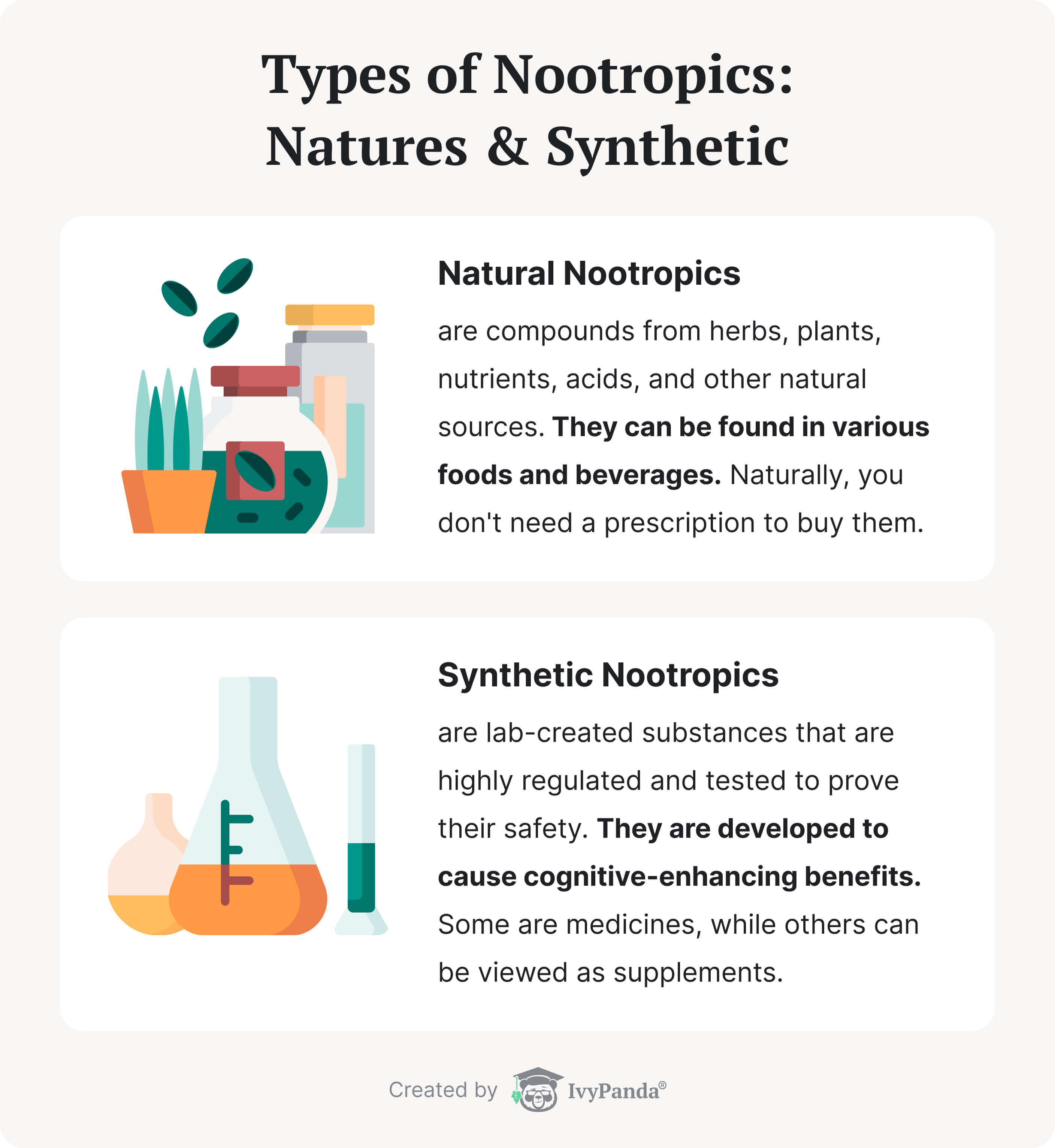
Below, we’ve separated smart drugs into three groupings: prescription meds (synthetic), food supplements (natural), and over-the-counter substances (mixed). You can also learn about the great variety of nootropics through the free essay samples on our website.
Prescription Drugs
Some individuals need nootropics to treat their health conditions. These drugs operate as stimulants. They make your brain compliant with your demands, such as “stay focused” or “memorize this piece of info.”
When it comes to academic studies, nootropics help students with ADHD, narcolepsy, sleep apnea, and similar disorders. They enable individuals to stay alert and concentrated. Older people with cognitive issues also take these prescription meds to treat their conditions.
This type of nootropic can be found in the following drugs:
- Adderall (Amphetamines). This medication is mainly prescribed to people with ADHD or narcolepsy. Adderall is highly stimulating as it is composed of amphetamines. The drug works by expanding the availability of brain chemicals. It allows your mind to feel more awake, attentive, and cheerful. Plus, its effect usually lasts up to 12 hours. Adderall’s side effects include sweating, low sex drive, and occasionally increased anxiety.
- Ritalin (Methylphenidate). This is another prescription drug that is used for treatment of ADHD symptoms. Just like Adderall, it elevates the concentrations of dopamine and noradrenaline in the body. However, it does not comprise amphetamines. Ritalin improves attention span, short-term memory, and the speed at which the brain handles information. Unfortunately, it is highly abused by students, particularly those between 18 and 25 years old. Among the usual side effects are stomach ache, loss of appetite, irritability, and insomnia.
- Provigil (Modafinil). Provigil is a prescription medication used to treat symptoms of excessive sleepiness due to narcolepsy and other sleep disorders. Some possible side effects include skin rash, mouth sores, fever, dark urine, and others.
- Axura (Memantine). This medicine contains memantine hydrochloride. It is used to treat patients with severe Alzheimer’s disease. The most common side effects of Axura are dizziness, dyspnea, constipation, and headache. Naturally, a doctor should supervise the treatment. Plus, a caregiver should regularly monitor the use of Axura by the patient.
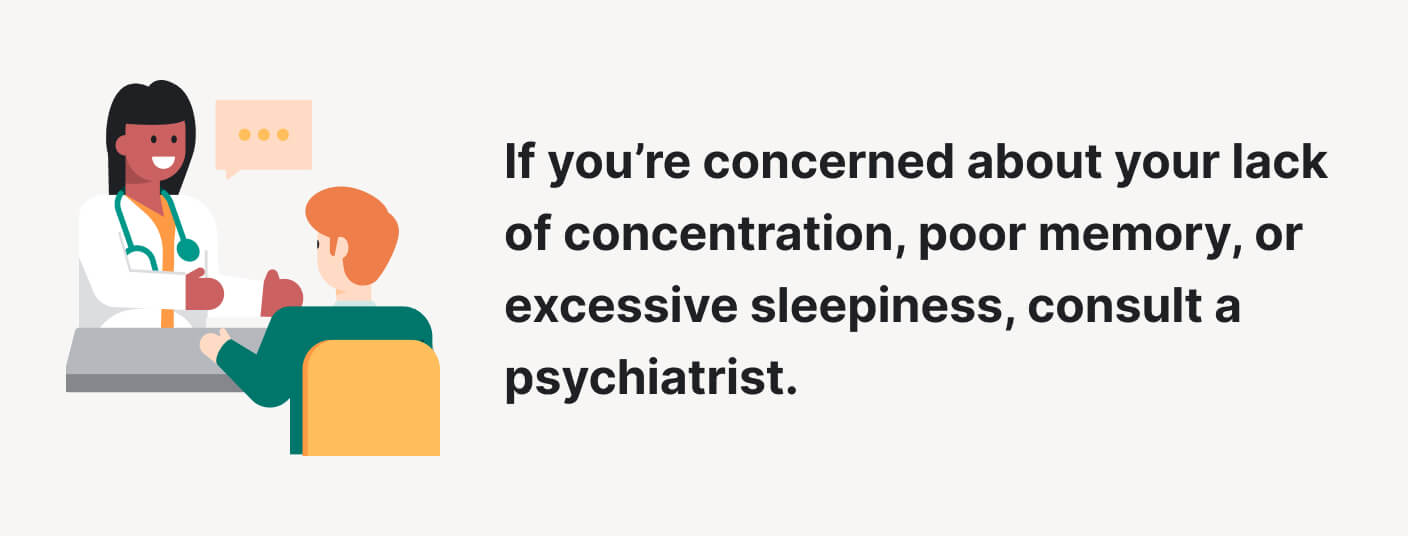
Naturally, such nootropics aren’t recommendable for people without corresponding conditions. Not only will they not improve your memory or focus if you don’t have an associated mental disorder, but they will also have an adverse impact on your health.
Are Prescription Nootropics Safe?
Even people who take nootropics according to their doctor’s advice are likely to deal with certain side effects:
Misuse or abuse of prescription drugs can have long-term consequences as well. These include developing mental conditions like depression, anxiety disorder, constant fatigue, as well as health issues related to the cardiovascular system, digestion, and sleep.
Research Done on Prescription Nootropics
- Innovative Mechanisms of Action for Pharmaceutical Cognitive Enhancement: A Systematic Review | Guillaume Fond et. al.
- Prescription Stimulants in Individuals with and without ADHD: Misuse, Cognitive Impact, and Adverse Effects | Shaheen E Lakhan and Annette Kirchgessner
- The Effects of Anti-Dementia and Nootropic Treatments on the Mortality of Patients with Dementia: A Population-Based Cohort Study in Taiwan | Chen-Yi Wu et al.
- Misuse of Prescription Drugs | National Institute on Drug Abuse (NIDA)
- Probable Nootropicinduced Psychiatric Adverse Effects: A Series of Four Cases | Farid Talih and Jean Ajaltouni
Dietary Supplements
There is an incredible variety of natural compounds that you can find in your day-to-day food that can help increase your concentration. Do you start your day with a cup of green tea or coffee? There’s your first nootropic. Smoking a cigarette? Another one!
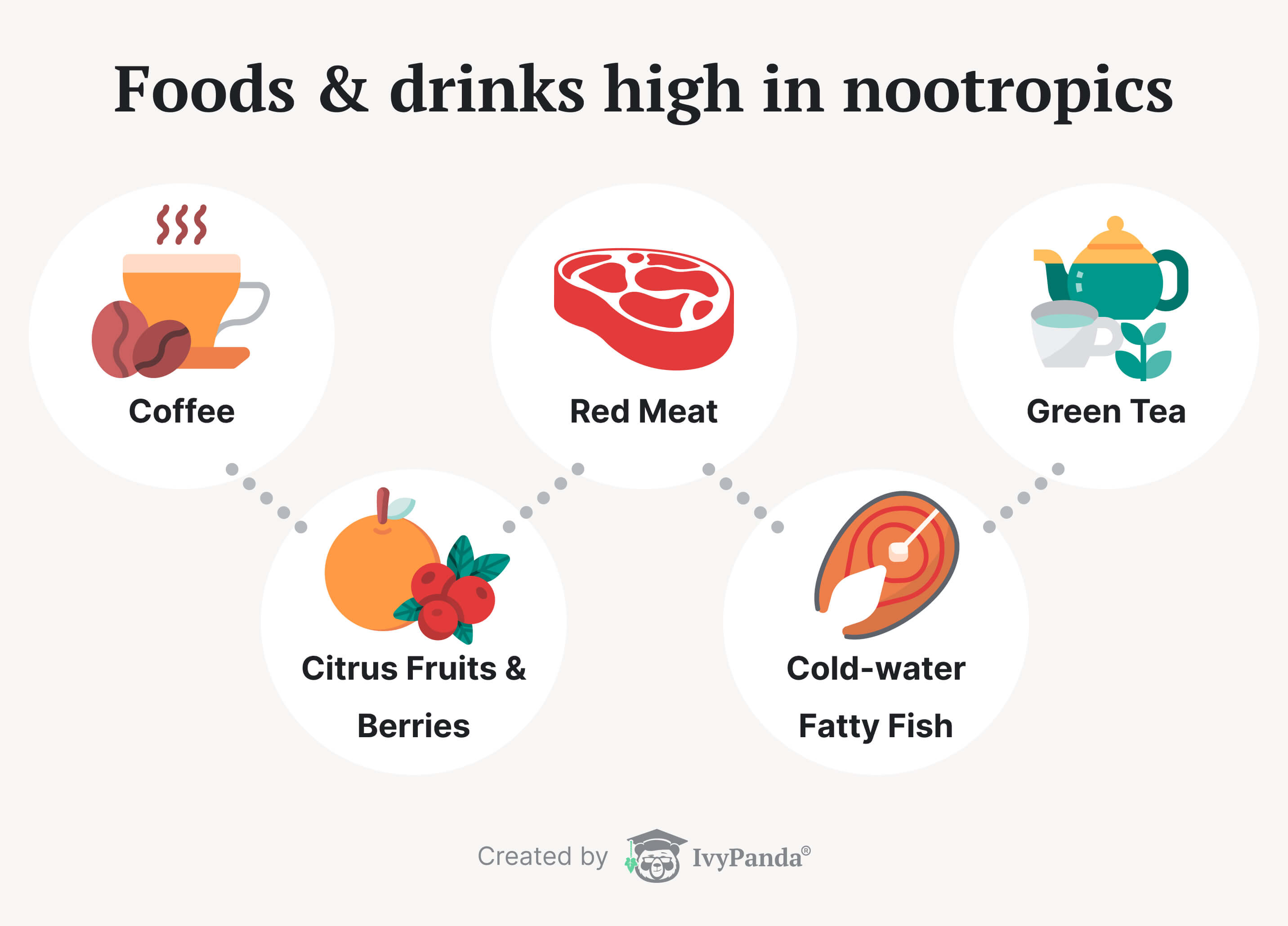
Here, we’ve listed some acknowledged and approved natural nootropics. Click on the respective links to check the studies on each supplement.
- Caffeine is the most routinely used psychoactive ingredient. It can be found in coffee, tea, kola nuts, cocoa, and guarana. Caffeine blocks specific receptors in the brain, which helps you feel less weary.
- Ginkgo biloba is among the most well-liked herbal remedies across the globe. As a successful cognitive enhancer, it works by increasing circulation to the brain and balancing chemicals. Ginkgo helps with poor memory, lousy concentration, depression, and many other issues.
- Ashwagandha grows in Asia and Africa. People usually take this plant to alleviate anxieties because of its corresponding chemicals. However, it can also help with insomnia, stress, and many other concerns. The only issue is that the long-term safety of this supplement is unknown. Large doses of ashwagandha can bring about stomach problems.
- Panax ginseng, also known as Korean ginseng, should not be confused with other sorts of ginseng. This specific plant grows in China, Siberia, and Korea. Panax is an adaptogen that is believed to help build resistance to pressure. It can also better cognitive functions and memory.
- L-Theanine is extracted from green and black teas, as well as mushrooms. This amino acid helps with anxiety and reduces insomnia and stress. It also has no known direct side effects. However, individuals should limit the dosage of tea consumed during pregnancy and while breastfeeding.
- Omega-3s are the nutrients contained in food or supplements, which are essential for healthy cells. The FDA suggests taking no more than 3g of Omega-3 daily, as high doses can increase bleeding.
- Bacopa monnieri is a plant that is used in Ayurvedic treatments. Sometimes this plant is also called Brahmi. This nootropic is recognized for its longevity and cognitive boosting effects. The most reported side effect is nausea.
- Rhodiola rosea can be found in Europe and Asia. This flower is frequently used in traditional medicine as it helps with various problems such as lethargy, stress, and depression. Several special warnings to regard when using Rhodiola:
- Avoid it during pregnancy.
- Don’t use it repeatedly if you have an autoimmune disease.
- Stop taking it while breastfeeding.
Are Dietary Supplements Safe?
If the original definition is to be trusted, all smart drugs are safe to use. However, we’ve already discussed prescription medication and how it can be abused. So, the “safety” factor must apply to the natural supplements, right?
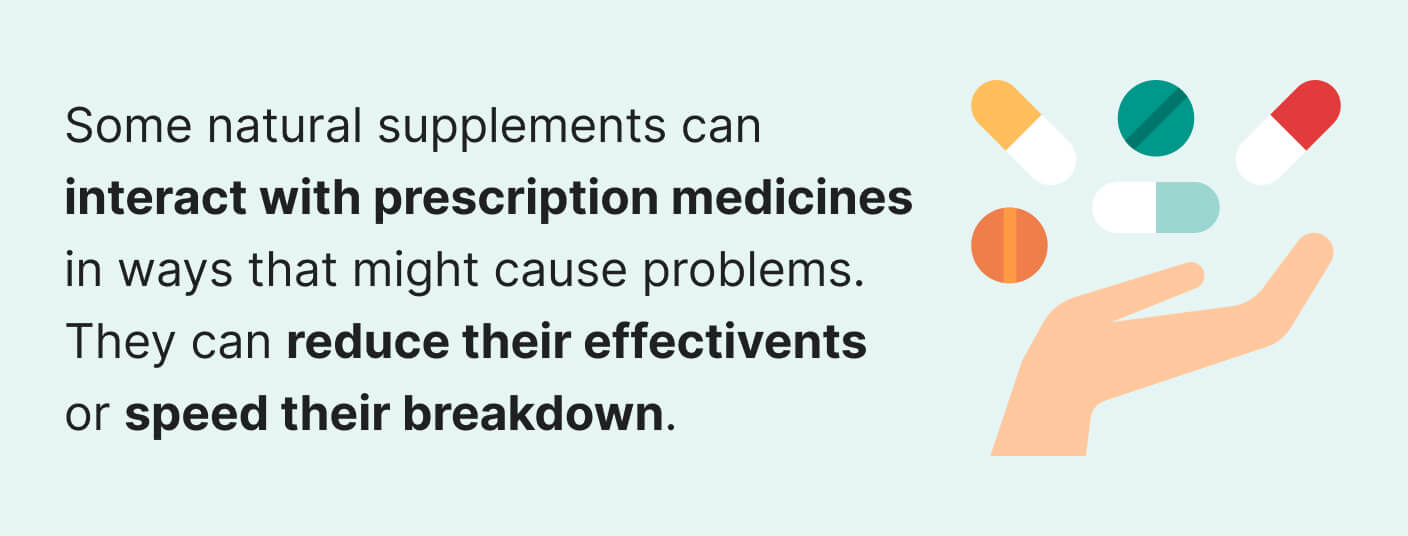
Setting medication aside, abuse of any substance can be harmful. You can experience issues that include:
Overall, natural supplements can be harmful when:
- You take too many nootropics.
One of the main reasons for side effects when taking nootropics is caused by consuming too much. Always make sure you know what the proper dosage of the supplements is. Most of the time, the overdose is not life-threatening but can cause stomach problems. - You take them too frequently.
Another way to overdose on natural supplements is by taking them too often. The daily intake of nootropics differs, so consider the norm for each. Doctors remind us that it is essential to watch how many times you consume any substance. - You combine them with other medications.
Sometimes nootropics interact with other medications. Thus, consult your doctor before taking any supplement with your prescribed drugs. Otherwise, your body and brain can react to the combination with study stress, paranoia, hypomania, panic attacks, etc.
Studies on Natural Supplements
- Effect of Nutrients, Dietary Supplements, and Vitamins on Cognition: a Systematic Review and Meta-Analysis of Randomized Controlled Trials | Scott C. Forbes et al.
- Cognitive Effects of Two Nutraceuticals Ginseng and Bacopa Benchmarked against Modafinil: a Review and Comparison of Effect Sizes | Chris Neale et al.
- Establishing Natural Nootropics: Recent Molecular Enhancement Influenced by Natural Nootropic | Noor Azuin Suliman et al.
- Beneficial Effects of Panax Ginseng for the Treatment and Prevention of Neurodegenerative Diseases | Ki Hyun Kim et al.
- Plant-derived Nootropics and Human Cognition | Cristina Lorca et al.
- Effects of Creatine Supplementation on Cognitive Function of Healthy Individuals | Konstantinos I. Avgerinos et al.
- The Impact of Fruit Flavonoids on Memory and Cognition | Jeremy P. E. Spencer
Over-the-Counter Nootropics
According to research, the best way to use natural nootropics is in combination. That’s why green tea, for example, is considered a great natural source of these compounds: it contains both L-Theanine and caffeine. Of course, this conclusion didn’t remain unnoticed by major corporations and manufacturers.
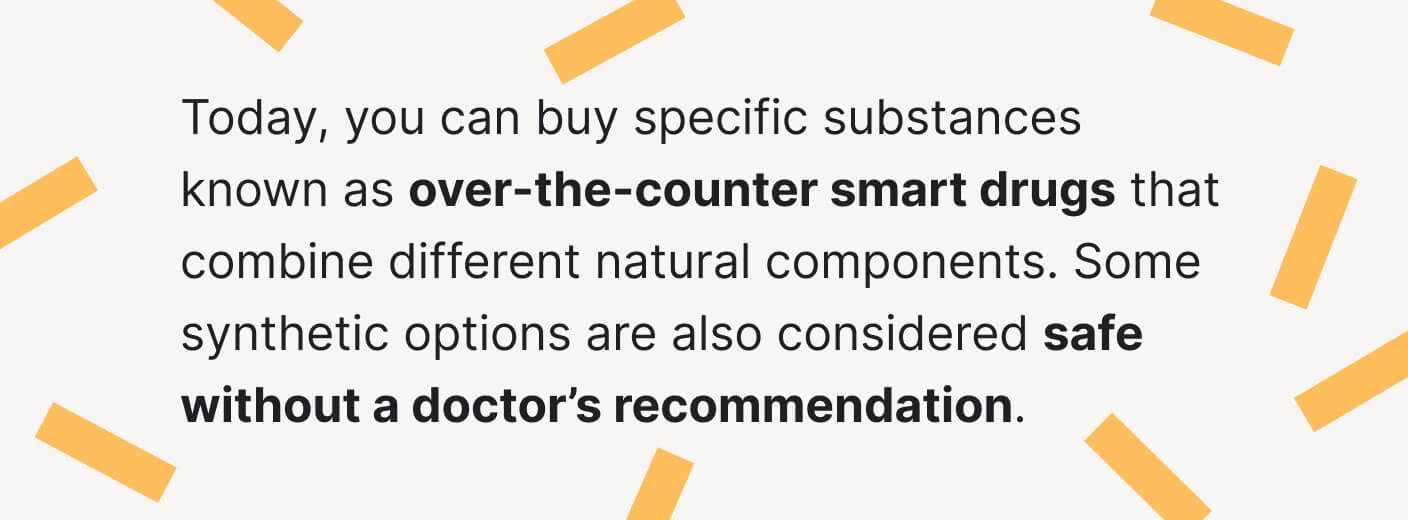
The following compounds can be found in nonprescription smart drugs:
- Racetams are a class of synthetic drugs, some of which are nootropics. Dr. Giurgea developed piracetam, which became the first smart drug ever produced. It was also the first kind of racetam. This nootropic improves cognitive ability but has no universally confirmed way of functioning. It is not currently approved by US FDA but is available in many other countries as a supplement.
- Citicoline is also known as CDP-choline. It is a natural chemical created to help people with cognitive impairment and memory loss. It can be used as a nonprescription alternative to Adderall. Its other benefits include improving blood flow and healing brain cells.
- Phosphatidylserine is a compound involved in synthesizing the brain cells’ membranes. It is said to positively affect brain health by boosting mental performance.
- Coenzyme Q10 is a compound naturally produced by the body. Each person has the level of this antioxidant decrease with age. Though it is found in nuts, fish, and meat, it may not be enough. So, CoQ10 is available as a supplement. It treats heart conditions and migraines.
- Vitamin B12 comes from many animal products and foods fortified with it. The human body needs it to form red blood cells. Thus, the deficiency of B12 can cause anemia.
- Maritime Pine Bark supplement grows on the Mediterranean Sea’s coast. It is known to improve mental processing and focus at any age. This supplement can also stimulate the immune system, enhance brain regeneration, and prevent swelling.
Are Such Smart Drugs Safe?
The central issue with over-the-counter nootropics is their novelty. Research has no definitive conclusions regarding their long-term effects as they appeared recently. However, they can confirm that this type of smart drug isn’t as regulated as prescription drugs. Thus, some adverse consequences may occur, especially when different nootropics are combined.
Generally, over-the-counter smart drugs can be dangerous for these reasons:
- Low-quality ingredients. Supplement manufacturers may combine formulas that cause harmful side effects. That can happen due to the low quality of the compounds used. Yet, it’s not an invitation to DIY your supplements. Home-made nootropics can create even more problems if you lack research or 100% approved ingredients.
- Unproven or exotic nootropics. Some smart drugs contain bizarre or unusual ingredients and an enormous amount of caffeine. The latter creates an illusion that the nootropics work. However, soon after taking them, people develop jitters and anxiety.
- Unsafe manufacturing quality. Cheap nootropics can be toxic and have serious side effects. That’s because they can be produced carelessly by people who don’t know what they are doing. Besides, these smart drugs can include low-quality vitamins, which will be challenging for the body to absorb. Going for products from a well-known and trustworthy manufacturer can prevent such risks.
- Contraindication. Some of the over-the-counter and even natural nootropics come in contact with prescription drugs. Thus, we recommend talking to medical professionals before adding any smart drugs to your list of medications.
The side effects of nonprescription smart drugs are similar to those of natural nootropics. Besides, you can get nauseated, severely anxious, and distressed. In some extreme cases, you might need hospitalization and gastric lavage. You can check other possible side effects in this study.
Top 7 Non-prescribed Nootropics
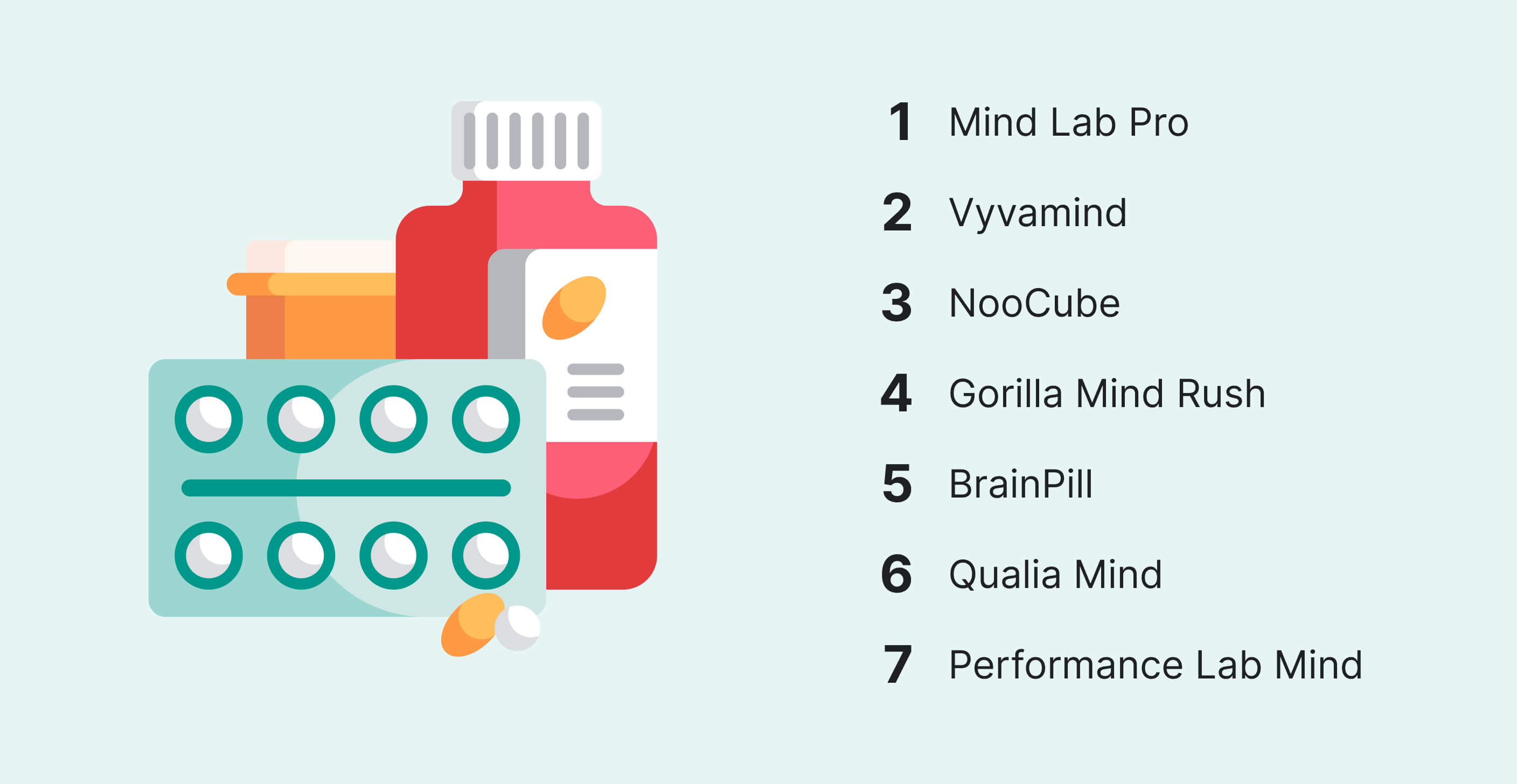
- Mind Lab Pro is an all-natural Adderall alternative that can help manage ADHD symptoms. Plus, it is not addictive. Some of the side effects can contain diarrhea and jitters. The average price is 69$ for the monthly supply.
- Vyvamind is a non-addictive cognitive enhancement for adults. It contains natural ingredients with very few side effects. The cost is also not too high, starting at 49.99 dollars for 60 pills.
- NooCube is another excellent nootropic alternative to Adderall. It also boosts overall mental health with ingredients such as Tacoma Monnieri and L-theanine. The average price for the supply is $59.99.
- Gorilla Mind Rush is one of the most potent supplements to enhance cognition and performance. Besides, individuals use it as a pre-workout. However, sometimes, it is unavailable for sale on the official website.
- BrainPill is a great brain booster. It promotes memory retention and cognitive performance, improving learning abilities. Although there are 13 nootropic ingredients combined, BrainPill has very mild side effects. The average price for the monthly supply is $70.95.
- Qualia Mind is a supplement with plenty of ingredients that cause creating neuroprotective responses and memory-boosting. It costs $139 for the monthly supply. So, it might not be affordable for long-term use.
- Performance Lab Mind is another nonprescription nootropic on the market that can be an Adderall alternative. It contains maritime pine bark, which helps with cognitive enhancement. It costs $69 for a monthly supply. Unfortunately, it is only available on the official website.
Research on Over-the-Counter Nootropics
- The Enhancement Use of Neuropharmaceuticals: More Scepticism and Caution Needed | Wayne D. Hall, Jayne C. Lucke
- Botox for the Brain: Enhancement of Cognition, Mood and Pro-social Behavior and Blunting of Unwanted Memories | Reinoud de Jongh et al.
- Cognitive Enhancers: Truth vs. Hype | Tripati Amruta et al.
- Nonmedical Use of Stimulants Is Associated With Riskier Sexual Practices and Other Forms of Impulsivity | Jon E. Grant et al.
- New Therapeutic Activity of Metabolic Enhancer Piracetam in Treatment of Neurodegenerative Disease | Dinesh Kumar Verma et al.
- The Authenticity and Quality of Rhodiola Rosea Products | Anthony Booker et al.
- Performance Enhancement at the Cost of Potential Brain Plasticity: Neural Ramifications of Nootropic Drugs in the Healthy Developing Brain | Kimberly R. Urban and Wen-Jun Gao
🤔 So, Should I Take Nootropics?
Unfortunately, there is no clear answer we can give you. We can only provide all the arguments for and against taking them.
Against Smart Drugs
- Prescription nootropics can be taken solely by people with appropriate medical conditions. Otherwise, people will likely suffer severe health consequences and won’t experience any mental improvement. And even students with narcolepsy, ADHD, etc., may have side effects from these smart drugs.
- Research has found no conclusive data that natural supplements really enhance students’ cognition. They tend to be helpful for older generations, but youngsters may not benefit from additional caffeine or creatine (even on the opposite).
- When it comes to over-the-counter smart drugs, they aren’t researched enough. As they require no prescription to be bought, they lack regulations and testing. So, we have to be more skeptical about them than some Internet sources suggest.

For Smart Drugs
- If you have a mental disorder that prevents you from staying focused or alert, prescription medicines will help you get your life and studies on track. You just need to get diagnosed beforehand and find appropriate pills.
- Since natural nootropics are mostly safe if taken responsibly, there is no reason to deny you vitamins or other food additives. What’s more, some dietary supplements can be as effective as prescription nootropics.
- Psychopharmacology and neuroscience are rapidly developing fields that try to find new solutions to any problem. So much so that you can find natural, synthetic, and mixed smart drugs without prescription that are likely to improve your mental skills.
✅ To sum up:
We don’t have a definitive answer, so you should decide for yourself. However, we should remind you that most nootropics only temporarily affect your brain and body. Consider other ways to boost your memory and academic performance for long-term solutions. Or talk to a mental health specialist if you suspect you have a related disorder.
🧠 What Else Can Enhance Your Cognition?
We’ve discussed foods, pills, and other substances that can improve your cognition. Now it’s time to consider what activities can do the same with fewer risks and side effects.
6 Activities to Boost Your Performance
- Exercise your mind. Our brain keeps constantly changing; scientists call this phenomenon “neural plasticity.” It concerns forming new connections and repairing broken links. We train our brains by acquiring new knowledge, experiences, and information.
- Get enough sleep. Otherwise, you are likely to suffer from poor memory and concentration. Adults need from seven to nine hours of slumber per day. Try to sleep this amount as it effectively promotes memory storage.
- Try calming activities. Stress can not only impact your mood but also reduce your memory. Several calming activities can help, such as meditation, playing games, or solving puzzles.
- Learn new skills & languages. You should always consider studying something new. Acquiring skills and languages stimulates your brain and enhances your memory function.
- Stay physically active. Not only can exercising can improve your health and mood, but it is also a must for your brain. Training does not have to be intense! Even 20-30 minutes of walking, swimming, or cycling can make a difference.
- Limit alcohol consumption & other harmful habits. Excessive drinking can be a risk factor for dementia as it interferes with the brain’s ability to retain memories. Besides, individuals can struggle to control balance and speech. Other unhealthy habits include consuming other harmful substances, exhaustion, eating too much junk food, and staying inactive.
Foods & Beverages to Improve Your Mind
Instead of taking nootropics to improve your cognition, you can adjust your diet to enable your brain to work better. Healthy food options can include harmless natural supplements discussed in the previous sections. So, here is the list of products that can energize your mind.
- Berries, such as blueberries and strawberries, are rich in anthocyanins. These are compounds that are believed to improve cognitive functions.
- Chocolate is rich in flavonoids. It has been proved that eating cocoa and chocolate can enhance brain function. Drinking cocoa benefits older people and kids.
- Nuts are some of the most versatile foods and snacks for brain health. They are packed with zinc, vitamin E, proteins, fibers, and healthy fats.
- Citruses also have a lot of health benefits. They are rich in flavonoids, rutin, hesperidin, etc. Studies show that orange juice can help boost cognitive performance.
- Eggs are called nature’s multivitamin because of how many nutrients it contains: vitamin B12, choline, and selenium. These nutrients improve brain performance, coordination, cognition, and motor functions.
- Avocados are a fruit that can be included in a variety of dishes. Besides suppressing appetite, it can help boost brain function, as it contains lutein.
- Beets are very rich in nitric oxide. This ingredient improves health, nerve cell communication, and blood flow.
- Full-fat Greek yogurt has a lot of proteins and B-vitamins. These are essential for brain cell regeneration.
- Oatmeal is a great energy source as oats are nutritious and high in fiber. Plus, you can add berries, cinnamon, apples, raisins, and nuts to the dish.
- Apples are a perfect substitute for sweets. Several studies have shown that eating them can improve brain health.
- Fatty fish is a good source of Vitamin D and Omega-3 acids. Eating it can make you more focused. It is associated with a slower mental decline.
- Plums can neutralize cell-damaging radicals that affect memory. They even help improve cognitive health in older adults.
Thank you for reading! As you can see, it is essential to look after your health from a young age. Therefore, choose carefully the substances and foods you are consuming. If you enjoyed learning about various nootropics, share this article with others who might be interested.
🔗 References
- Nootropics, or ‘Smart Drugs,’ Are Gaining Popularity. Should You Take Them – Markham Heid, Time
- Nootropics: Types, Safety, and Risks of Smart Drugs – Medical News Today
- Nootropics (“Smart Drugs” or “Cognitive Enhancers”): What to Know – Barbara Brody, WebMD
- Nootropics: What They Are, How They Work, and 5 Natural Options – Ashley Laderer, Insider
- You Can Increase Your Intelligence: 5 Ways to Maximize Your Cognitive Potential – Andrea Kuszewski, Scientific American
- The Definitive Guide to Nootropics – David Tomen, NootropicsExpert


![Traveling as a Student [Guide + Infographic]](https://ivypanda.com/blog/wp-content/uploads/2021/10/traveler-asian-woman-spending-holiday-trip-ayutthaya-thailand-309x208.jpg)
![220 Mental Health Resources for Students [Free & Affordable]](https://ivypanda.com/blog/wp-content/uploads/2021/08/couple-meditating-practicing-yoga-home-sofa-focus-hands-309x208.jpg)